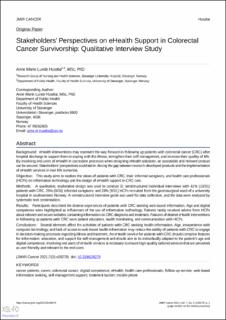| dc.contributor.author | Husebø, Anne Marie Lunde | |
| dc.date.accessioned | 2021-09-17T08:05:37Z | |
| dc.date.available | 2021-09-17T08:05:37Z | |
| dc.date.created | 2021-09-10T10:53:06Z | |
| dc.date.issued | 2021-02 | |
| dc.identifier.citation | Husebø, A.M.L. (2021) Stakeholders’ Perspectives on eHealth Support in Colorectal Cancer Survivorship: Qualitative Interview Study. JMIR Cancer, 7(3), e28279 | en_US |
| dc.identifier.issn | 2369-1999 | |
| dc.identifier.uri | https://hdl.handle.net/11250/2778816 | |
| dc.description.abstract | Background:
eHealth interventions may represent the way forward in following up patients with colorectal cancer (CRC) after hospital discharge to support them in coping with the illness, strengthen their self-management, and increase their quality of life. By involving end users of eHealth in cocreation processes when designing eHealth solutions, an acceptable and relevant product can be secured. Stakeholders’ perspectives could aid in closing the gap between research-developed products and the implementation of eHealth services in real-life scenarios.
Objective:
This study aims to explore the views of patients with CRC, their informal caregivers, and health care professionals (HCPs) on information technology and the design of eHealth support in CRC care.
Methods:
A qualitative, explorative design was used to conduct 31 semistructured individual interviews with 41% (13/31) patients with CRC, 29% (9/31) informal caregivers, and 29% (9/31) HCPs recruited from the gastrosurgical ward of a university hospital in southwestern Norway. A semistructured interview guide was used for data collection, and the data were analyzed by systematic text condensation.
Results:
Participants described the diverse experiences of patients with CRC seeking web-based information. Age and digital competence were highlighted as influencers of the use of information technology. Patients rarely received advice from HCPs about relevant and secure websites containing information on CRC diagnosis and treatment. Features of desired eHealth interventions in following up patients with CRC were patient education, health monitoring, and communication with HCPs.
Conclusions:
Several elements affect the activities of patients with CRC seeking health information. Age, inexperience with computer technology, and lack of access to web-based health information may reduce the ability of patients with CRC to engage in decision-making processes regarding illness and treatment. An eHealth service for patients with CRC should comprise features for information, education, and support for self-management and should aim to be individually adapted to the patient’s age and digital competence. Involving end users of eHealth services is necessary to ensure high-quality tailored services that are perceived as user friendly and relevant to the end users. | en_US |
| dc.language.iso | eng | en_US |
| dc.publisher | JMIR Publications | en_US |
| dc.rights | Navngivelse 4.0 Internasjonal | * |
| dc.rights.uri | http://creativecommons.org/licenses/by/4.0/deed.no | * |
| dc.subject | kolorektal kreft | en_US |
| dc.subject | e-helse | en_US |
| dc.subject | digital komptanse | en_US |
| dc.subject | nettbasert informasjonssøking | en_US |
| dc.title | Stakeholders’ Perspectives on eHealth Support in Colorectal Cancer Survivorship: Qualitative Interview Study | en_US |
| dc.type | Peer reviewed | en_US |
| dc.type | Journal article | en_US |
| dc.description.version | publishedVersion | en_US |
| dc.rights.holder | © Anne Marie Lunde Husebø. | en_US |
| dc.subject.nsi | VDP::Medisinske Fag: 700::Klinisk medisinske fag: 750::Onkologi: 762 | en_US |
| dc.source.volume | 7 | en_US |
| dc.source.journal | JMIR Cancer | en_US |
| dc.source.issue | 3 | en_US |
| dc.identifier.doi | 10.2196/28279 | |
| dc.identifier.cristin | 1933139 | |
| dc.source.articlenumber | e28279 | en_US |
| cristin.ispublished | true | |
| cristin.fulltext | original | |
| cristin.qualitycode | 1 | |

